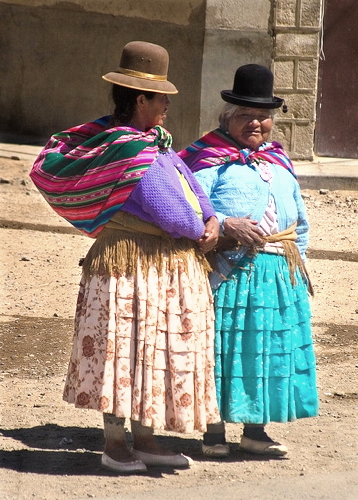
(above) In Bolivia live both Aymara and Quecha people. The Aymara women wear skirts that are slightly lower in the front than in the back. (Photo : Photo by Pedro Szekely/Flickr)
Indigenous Bolivian Women Use Their Sewing Skills to Save the Lives of Children Born With Heart Defects
March 30, 2015 - Latin Post
The indigenous Aymara women of Bolivia are helping save the lives of children born with heart defects.
By Roberto Ontiveros (staff@latinpost.com)
They are applying their tradition-based sewing skills to the production of a hi-tech medical product, which is used to seal up a hole in the heart that some babies are born with.
The Nit Occlud device, which was designed by cardiologist Franz Freudenthal, takes about two hours to put together.
Dr. Freudenthal set up his clinic in La Paz in order to help children born with heart problems and has, in the course of his work, saved hundreds of young lives.
Due to the intricate work required to produce the small baby-saving device, which happens to be too difficult to produce on a mass scale, the doctor has enlisted a host of Bolivia's traditional craft knitters to make them by hand.
As reported by the BBC, Dr Freudenthal spoke about his decision to employ the indigenous Bolivian women in the production of the medical device, saying, "The most important thing is that we try to get really really simple solutions for complex problems."
Any inexpensive innovation in the production of this medical device is welcomed, as Bolivia, being the poorest country in south America, lacks enough specialist hospitals and cardiac doctors to treat the children born with heart problems.
The Nit Occlud device is constructed by weaving a single strand of a super-elastic metal known as nitinol which is ordinarily used in military industries. The nickel-titanium alloy can memorize its own shape and can be folded up inside a slim catheter which a cardiologist then inserts into the groin.
The device remains folded as it moves through blood vessels and is expanded only when it reaches the right spot in the heart where it then recovers its original shape and blocks the hole or ductus that has caused the heart problems.
Dr. Freudenthal says that by not operating with an open heart, doctors are "respecting the will of many patients who would not want their children to be operated otherwise."